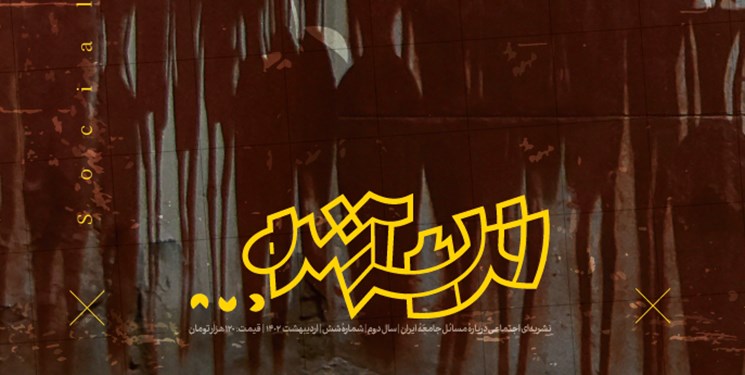The sixth issue of “Andiseh Aindeh” magazine was published

According to Fars news agency’s social damage group, the sixth issue of “Andiseh Aindeh” magazine was published with a review of the issue of exclusion.
In this issue, “Future Thought” has tried to deal with the problems in Iranian society under the concept of exclusion, which have emerged due to the lack of attention of policymakers and academics to this concept. The concept of exclusion, in this media review, is associated with all kinds of inequality at different social levels that reproduce themselves in the society and ultimately bring citizens to the border of social rebellion. Exclusion is a long-standing concept in social sciences, and its combination with a meaning close to “citizens’ feeling of inequality” in accessing their rights, turns it into a new concept worthy of attention. The effort of “Future Thought” in this issue is to examine exclusion in the two fields of “ethnography-field narratives” and “expansion of theoretical literature”.
The concept of exclusion has been discussed in the sixth issue of this magazine, considering five different social fields. The first area is the feeling of inequality and lack of access to equal rights in economic matters. In this case, a conversation was held with Vahid Mahmoudi, an economist and justice researcher, regarding exclusion and inequality, and various reports tried to discuss the relationship between prominent economic variables and the feeling of exclusion. Field reports of jobs that are affected by exclusion and the relationship between the feeling of exclusion and migration are also among the other discussions of this case.
Another side of the discussion of social exclusion is the feeling of inequality in access to land and housing. In this part of the magazine, the feeling of rejection and marginalization in relation to access to housing and land and housing policies is investigated. In this issue, Kamal Athari talked about the connection between exclusion and housing in Iran, and Amir Mohammad Khani, the head of the Islamic Revolution Architecture Foundation, also showed in a speech how exclusion can marginalize different classes and groups in an objective sense. Other parts of this section are real narratives of marginalization and the relationship between exclusion and unequal access to urban space and materialization.
Rejection in the political field is also another part of this issue of “Future Thought”. In this case, an attempt has been made to investigate the relationship between the feeling of being ignored and the lack of political representation. In this section, in a conversation with Parviz Amini, it is shown how rejection in a relationship between lack of representation, one-sided speeches and inequality is transforming the Iranian society. Looking at surveys, statistics and trying to understand the feeling of lack of representation is another part of this review. The exploration of the concept of political exclusion in this case also includes the following topics: the investigation of the negative protest of the participation rate in the elections, the attempt to restore the intermediary institutions in the public sphere, and finally, a detailed examination of the idea of the media as an intermediary institution to prevent the feeling of exclusion.
Intergenerational differences in terms of size, scope and impact can be considered as one of the most important issues in the feeling of being neglected in Iranian society. An important part of the youth wishes that their voice – as it is and not as it should or seems desirable – to be recognized. This desire to be heard causes them to turn to behaviors that distinguish their voices from official voices. In the fourth issue of the sixth issue of “Future Thought”, we read the voice of the new generation in their own words and in a conversation with the representatives of their generation. In this section, changes and resistances in the new generation against rejection are also the subject of a conversation with Jabar Rahmani, faculty member of the Institute of Cultural and Social Studies.
The sound of the new generation in its music, which is the music of rejection, or rap, is the source of another report in this section. In this episode, Nematullah Fazli spoke about the relationship between rejection and the educational system, Amirhossein Khalilzadeh, a director and documentary maker, spoke about his experiences in dealing with the new generation, and finally, Majid Soleimani, an assistant professor of social sciences at the University of Tehran, also spoke about Castells and social movements. In the media era, he has raised some points.
The final part of the sixth issue of “Future Thought”, which is the last aspect of the study of the concept of exclusion, is dedicated to ethnic groups and women. In his interview, Abdul Wahab Shahlibar showed how the center-periphery duality leads to the double exclusion of ethnic groups and minorities. A discussion of the feeling of rejection in Sistan, affected by the education system, with Farshad Mohammadzadeh is another part of this case. Also, in a report, the feeling of exclusion among women due to salary cuts was discussed, and Fatemeh Mousavi Vayaye, in her formulation of women’s issues, expressed the most important challenges in this area in a speech. Finally, Mohsen Islamzadeh also talked about rejected women who were in front of his camera.
The “taxi writing” of this issue also includes narratives from the community through conversations with passengers who happened to be traveling together with the narrator. In this part, “Future Thought” tries to present a new section of attention to the text of the society by listening to what comes from the hearts of people of different classes and with different views. Passengers have been reflected on the subject.
The sixth issue of “Andiseh Aindeh” magazine, authored by Ahmad Naderi and editor-in-chief, Matin Mahjoub, is available to the public on the counter of the country’s press.
end of message/
You can edit this article
Suggest this article for the first page

